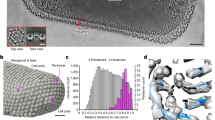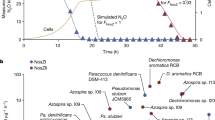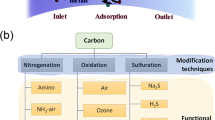Abstract
Butlin, Adams and Thomas1 have described methods for the isolation and cultivation of pure strains of Desulphovibrio desulphuricans. In order to grow large numbers of cells for manometric work, it is preferable to use a richer medium than any of those described, and one based on peptone and glucose has been found capable of supporting massive growth of certain strains (up to about 0·8 mgm. dried cells/ml.) in about seventy-two hours, growth being visible in less than twenty hours. Its composition is: glucose 10·0 gm.; MgSO4.7H2O, 1·5 gm. ; Na2SO4, 1·5 gm. ; Difco peptone, 20 gm., or Difco peptone, 5 gm., and yeast extract, 4 gm. ; tap water, 1,000 ml. ; pH 6·3. No addition of iron is necessary, and no ferrous sulphide is precipitated during growth.
This is a preview of subscription content, access via your institution
Access options
Subscribe to this journal
Receive 51 print issues and online access
$199.00 per year
only $3.90 per issue
Buy this article
- Purchase on Springer Link
- Instant access to full article PDF
Prices may be subject to local taxes which are calculated during checkout
Similar content being viewed by others
Author information
Authors and Affiliations
Rights and permissions
About this article
Cite this article
POSTGATE, J. Competitive Inhibition of Sulphate Reduction by Selenate. Nature 164, 670–671 (1949). https://doi.org/10.1038/164670b0
Issue Date:
DOI: https://doi.org/10.1038/164670b0
This article is cited by
-
Anion transport as a target of adaption to perchlorate in sulfate-reducing communities
The ISME Journal (2020)
-
Biological responses related to agonistic, antagonistic and synergistic interactions of chemical species
Analytical and Bioanalytical Chemistry (2012)
-
Strain DCB-1 conserves energy for growth from reductive dechlorination coupled to formate oxidation
Archives of Microbiology (1990)
-
Characterization of sulfate transport in Desulfovibrio desulfuricans
Archives of Microbiology (1989)
-
Depletion of adenosine triphosphate inDesulfovibrio by oxyanions of group VI elements
Current Microbiology (1979)
Comments
By submitting a comment you agree to abide by our Terms and Community Guidelines. If you find something abusive or that does not comply with our terms or guidelines please flag it as inappropriate.



